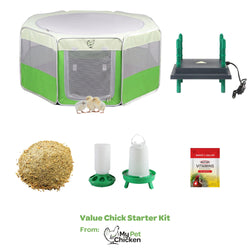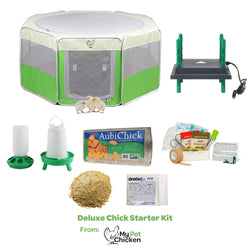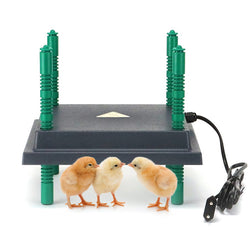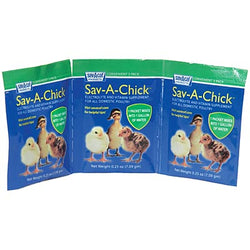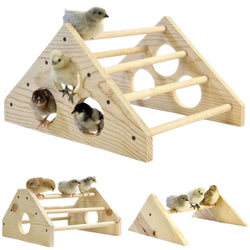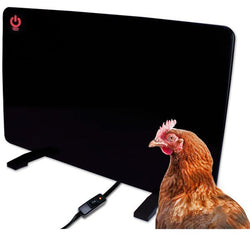Would crows ever attack or eat my chickens?
Back to blog
Name:
Crows and other corvids
Corvus spp
Description:
*Corvids are large perching birds, usually with dark coloration, although some (especially tropical species) can be very brightly feathered.
*Some in this group can be up to three pounds
Distribution/Habitat:
Found throughout the world
Hunting Behavior:
Crows are among the most intelligent animals, and can even make and use tools. They can also recognize individual people by their faces.
If they attack your flock at all, it will probably be an attack of opportunity on chicks, very small bantams or very young birds. They may also be sneaky and try to steal eggs. They are very unlikely to attack adult chickens. If you see a large bird carrying off a chick from afar, you will probably be able to tell whether it is a bird of prey of some sort (such as a hawk or owl) or a crow or corvid, because a hawk will carry prey off with its feet, while a crow will carry prey off in its beak . Corvids are not raptors and will simply not attack the way birds of prey will. In fact, the word "raptor" comes from a Latin word which means "to seize," and it refers to the raptors' proclivity for seizing prey with their strong feet and talons.
The truth is that crows are fairly unlikely predators--even for your young birds or eggs. They are listed here because occasional reports of predation have been made in connection with the loss of young chicks or eggs. Crows are opportunists, if not hunters, and if they see an easy meal, they may take it. They may spot and eat eggs laid in the yard rather than in the coop, and in cases where eggs aren't gathered frequently enough, may even learn to sneak into your coop to steal food or eggs from nests.
With that said, generally speaking, if there are crows around your house or coop it is good news for your flock. Crows hate hawks, so they will often mob up into a large group to drive away any hawk who makes the mistake of hanging around in their area. Crows recognize that hawks will prey on their eggs and chicks, so whole groups of them will harass the real predators until they leave.
You can see in the videos why groups of crows are called "murders"--they can be relentless in pursuit when they are attacking a hawk! If you live in town, and don't have roosters around, the loud, scolding warning of the crows can alert your hens that a predator is in the area. My roosters have learned to heed the warnings of crows from very far away--so even when a hawk is out of sight from our house, when the crows start calling, our roosters herd the girls to cover until the crows stop and the coast is clear.
Protecting Your Flock
To keep your flock safe from crows, follow the same precautions as for hawks and other birds of prey. However, since crows and corvids are such unlikely predators of adult birds, generally your flock will be safe from crows if you simply keep them inside or in a covered run until they are three months old or so. Small bantams may need additional protection.
To reiterate, though, if you have crows in your area, it is generally cause for celebration, since it means your chickens will be alerted to attacks from real hunters like hawks and owls, so attacks from birds of prey will be much less successful.
Crows and other corvids
Corvus spp
Description:
*Corvids are large perching birds, usually with dark coloration, although some (especially tropical species) can be very brightly feathered.
*Some in this group can be up to three pounds
Distribution/Habitat:
Found throughout the world
Hunting Behavior:
Crows are among the most intelligent animals, and can even make and use tools. They can also recognize individual people by their faces.
If they attack your flock at all, it will probably be an attack of opportunity on chicks, very small bantams or very young birds. They may also be sneaky and try to steal eggs. They are very unlikely to attack adult chickens. If you see a large bird carrying off a chick from afar, you will probably be able to tell whether it is a bird of prey of some sort (such as a hawk or owl) or a crow or corvid, because a hawk will carry prey off with its feet, while a crow will carry prey off in its beak . Corvids are not raptors and will simply not attack the way birds of prey will. In fact, the word "raptor" comes from a Latin word which means "to seize," and it refers to the raptors' proclivity for seizing prey with their strong feet and talons.
The truth is that crows are fairly unlikely predators--even for your young birds or eggs. They are listed here because occasional reports of predation have been made in connection with the loss of young chicks or eggs. Crows are opportunists, if not hunters, and if they see an easy meal, they may take it. They may spot and eat eggs laid in the yard rather than in the coop, and in cases where eggs aren't gathered frequently enough, may even learn to sneak into your coop to steal food or eggs from nests.
With that said, generally speaking, if there are crows around your house or coop it is good news for your flock. Crows hate hawks, so they will often mob up into a large group to drive away any hawk who makes the mistake of hanging around in their area. Crows recognize that hawks will prey on their eggs and chicks, so whole groups of them will harass the real predators until they leave.
You can see in the videos why groups of crows are called "murders"--they can be relentless in pursuit when they are attacking a hawk! If you live in town, and don't have roosters around, the loud, scolding warning of the crows can alert your hens that a predator is in the area. My roosters have learned to heed the warnings of crows from very far away--so even when a hawk is out of sight from our house, when the crows start calling, our roosters herd the girls to cover until the crows stop and the coast is clear.
Protecting Your Flock
To keep your flock safe from crows, follow the same precautions as for hawks and other birds of prey. However, since crows and corvids are such unlikely predators of adult birds, generally your flock will be safe from crows if you simply keep them inside or in a covered run until they are three months old or so. Small bantams may need additional protection.
To reiterate, though, if you have crows in your area, it is generally cause for celebration, since it means your chickens will be alerted to attacks from real hunters like hawks and owls, so attacks from birds of prey will be much less successful.

